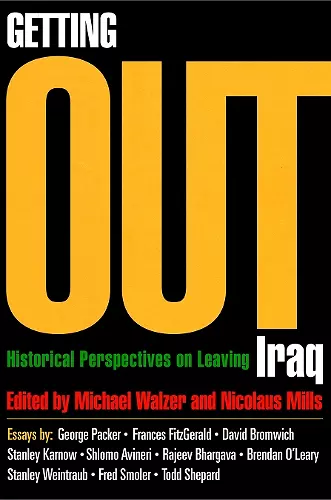Getting Out
Historical Perspectives on Leaving Iraq
Nicolaus Mills editor Michael Walzer editor
Format:Hardback
Publisher:University of Pennsylvania Press
Published:22nd Sep '09
Currently unavailable, and unfortunately no date known when it will be back

In Getting Out, a diverse cast of noted scholars and journalists considers how the United States might leave Iraq by examining seven historical case studies on how to and how not to withdraw from occupied territory.
Eventually every conqueror, every imperial power, every occupying army gets out. Why do they decide to leave? And how do political and military leaders manage withdrawal? Do they take with them those who might be at risk if left behind? What are the immediate consequences of departure? For Michael Walzer and Nicolaus Mills, now is the time to ask those questions about exiting—and to worry specifically about the difficulties certain to arise as we leave—Iraq.
Getting Out approaches these issues in two sections. The first, entitled "Lessons Learned," examines seven historical cases of how and how not to withdraw: Britain's departure from the American colonies and from India, the French withdrawal from Algeria, Israel's unilateral withdrawal from Gaza, and the U.S. decision to leave (or not leave) the Philippines, Korea, and Vietnam. These cases offer a comparative perspective and an opportunity to learn from the history of political and military retreats.
The second section, "Exiting Iraq," begins with an introduction to just how the United States got into Iraq and continues with an examination of how the U.S. might leave from a diversity of voices, ranging from those who believe that the Iraq war has produced no real good to those who hope for a decent ending. In addition to essays by volume editors Walzer and Mills, Getting Out features contributions by Shlomo Avineri, Rajeev Bhargava, David Bromwich, Frances FitzGerald, Stanley Karnow, Brendan O'Leary, George Packer, Todd Shepard, Fred Smoler, and Stanley Weintraub.
"An arresting, morally serious book, of the sort that readers have come to expect from the precincts of Dissent." * Sean Wilentz, author of The Rise of American Democracy: Jackson to Lincoln *
"From Stanley Weintraub's crisp essay on Great Britain's withdrawal from the Colonies after its defeat in the American Revolutionary War to studies of much more recent disengagements, the contributions offer a variety of useful and stimulating perspectives on the complex problems involved in orderly withdrawals." * Walter Russell Mead, Foreign Affairs *
"This admirable book makes it plain that one reason why military occupations are, in general, a bad idea, is that exit ramps get blocked and horrors ensue. It is morally evident that, for the occupying power, there is no end to responsibilities, which begin even in nightmares. This is not a book that offers simple recipes for Iraq or Afghanistan. But people of all persuasions should read it to deepen their awareness of the moral imperatives." * Todd Gitlin, Columbia University *
"This collection will appeal to a broad audience. Excellent at dealing with a complicated topic both historically and in terms of the current situation in Iraq, it will appeal to anyone interested in the fate of our world today." * Library Journal *
ISBN: 9780812242164
Dimensions: unknown
Weight: unknown
168 pages